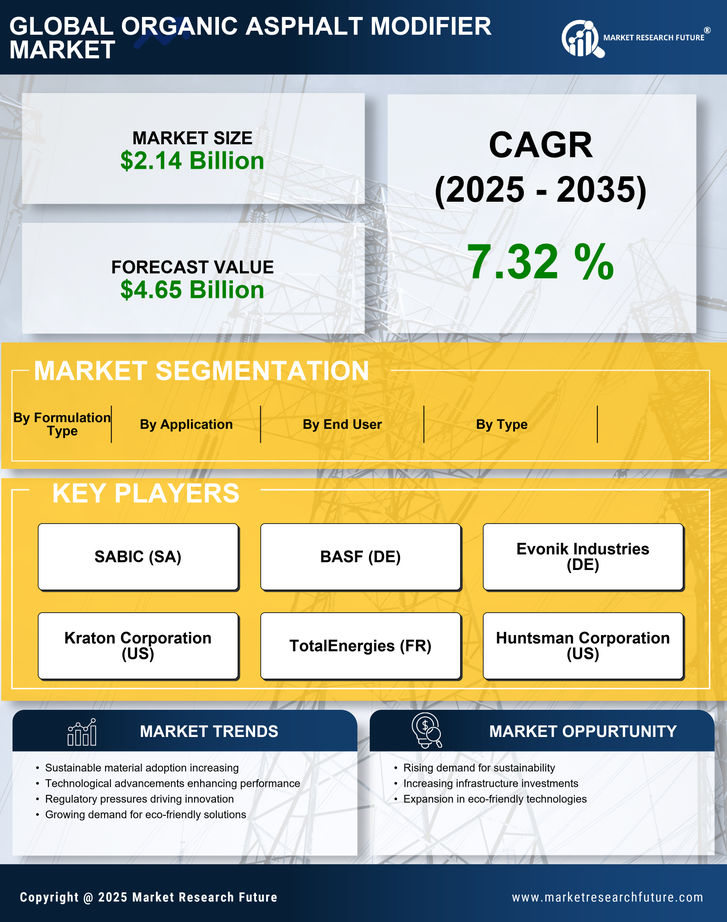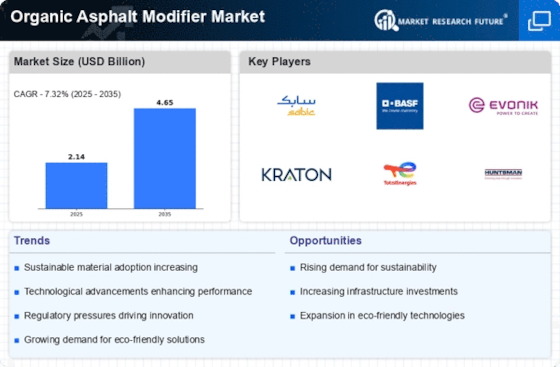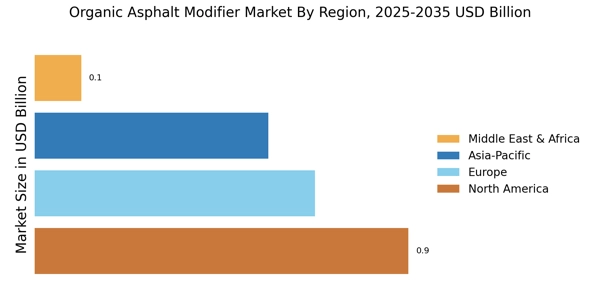Regulatory Compliance
Stringent regulations regarding road safety and environmental impact are driving the Organic Asphalt Modifier Market. Governments worldwide are implementing policies that mandate the use of safer and more sustainable materials in road construction. Organic asphalt modifiers, which offer enhanced performance and reduced environmental impact, are well-positioned to meet these regulatory requirements. Data suggests that regions with strict environmental regulations are witnessing a higher adoption rate of organic modifiers, as companies seek to comply with these laws. This regulatory landscape may create a favorable environment for the growth of the organic asphalt modifier market.
Market Diversification
The diversification of applications for organic asphalt modifiers is emerging as a key driver for the Organic Asphalt Modifier Market. Beyond traditional road construction, these modifiers are finding uses in various sectors, including roofing, airport runways, and parking lots. This broadening of application areas is likely to enhance market penetration and stimulate growth. Market analysis indicates that the demand for organic asphalt modifiers in non-road applications is expected to increase, potentially accounting for a significant share of the market. This diversification not only opens new revenue streams but also positions organic modifiers as versatile solutions in the construction industry.
Technological Innovations
Technological advancements in the production and application of organic asphalt modifiers are likely to propel the Organic Asphalt Modifier Market forward. Innovations such as improved polymer blends and enhanced processing techniques have led to the development of more efficient and durable asphalt products. For instance, the introduction of nanotechnology in asphalt modification has shown potential in enhancing performance characteristics. Market data indicates that the adoption of advanced technologies could increase the efficiency of asphalt production by up to 20%, thereby reducing costs and improving product quality. This technological evolution may attract more stakeholders to the organic asphalt modifier segment.
Infrastructure Development
The ongoing infrastructure development projects across various regions are expected to significantly impact the Organic Asphalt Modifier Market. Governments are investing heavily in road construction and maintenance, which necessitates the use of high-performance materials. Organic asphalt modifiers, known for their superior performance and longevity, are increasingly being specified in these projects. According to recent statistics, the global infrastructure spending is anticipated to reach trillions of dollars in the coming years, creating a substantial demand for advanced asphalt solutions. This trend indicates a robust market opportunity for organic modifiers as they meet the performance requirements of modern infrastructure.
Sustainability Initiatives
The increasing emphasis on sustainability within the construction sector appears to be a primary driver for the Organic Asphalt Modifier Market. As environmental regulations tighten, there is a growing demand for eco-friendly materials that reduce carbon footprints. Organic asphalt modifiers, derived from renewable resources, align with these sustainability goals. Reports indicate that the market for sustainable construction materials is projected to grow at a compound annual growth rate of approximately 10% over the next five years. This trend suggests that companies adopting organic modifiers may gain a competitive edge, as they cater to environmentally conscious consumers and comply with stringent regulations.


















